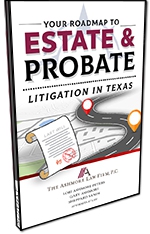When I meet with clients it seems there's one question I'm asked over and over again: “Do I need a Trust?”
As I explain to these clients and potential clients, if they were to interview five estate planning attorneys, they may get five different answers. Although there are many reasons why you may need a trust, it is my opinion that not everyone needs a trust. This article will discuss 6 reasons why you may need a trust. Please keep in mind this list is by no means all-inclusive.
1. Out of State Property.
If you have any real estate that is not located in the State of Texas, you need to consider creating a Trust to hold the property. It is important to understand Texas laws do not govern any real property you own outside of the State of Texas. Real estate is governed by the state laws where it is located. Because of this, in order to pass this real estate to the beneficiaries you have chosen, your Independent Executor has the duty to hire an attorney in each State where you have real property to go through the probate process. Although this may not sound like a big deal, it can be quite cumbersome. In order to simplify this process, we recommend to our clients to create a Revocable Living Trust (RLT). The main purpose of this trust is to ensure the smooth transition of passing your real property to your beneficiaries without the necessity of going to court.
2. Special Needs planning for a loved one.
If you have a child with any kind of Special Needs, the most effective way to protect them is by creating a Special Needs Trust (SNT). This Trust can be prepared during your lifetime, or in your Will, which means it will not take effect until you die. This Trust can also protect any government benefits your child may be getting. This is a very specialized Trust that can manage the assets you have set aside for your child with a disability while also maintaining that child’s eligibility for public assistance benefits.
3. Perfect asset protection for your children.
Do you want to make sure your hard-earned money goes to your children and NOT to an ex-spouse or a creditor? If so, you need to consider placing your assets into a Trust. This Trust can either be created during your lifetime or upon your death. By setting up the proper Trust you can make sure 100% of your assets will always be available for your children and will not go to a creditor or ex-spouse. In addition, if your child was married for 5, 10, or even 20 years and got a divorce, their ex could not get to any of the assets in the Trust. That is why we consider it to be perfect asset protection.
4. Privacy.
When someone dies and has to go through the court process, their assets generally become public record. This means family, friends or even strangers can go to the courthouse and see all of your assets. In order to protect your privacy, you can place your assets in a Trust while you are alive. You maintain full use of the assets in the Trust but the Trust remains completely private.
5. Spendthrift.
We hear quite often from our clients, “if we give our son or daughter any money, no matter how much or little, it will be spent in no time at all.” As an attorney, the word we use to describe this child is “Spendthrift.” There is a special Trust that can be created for the benefit of your loved one. This trust can either take affect during your lifetime or upon your death. As the creator of the Trust, you appoint a Trustee, who is someone you trust, or even a Bank or Trust Company. All of the assets of the Trust are used for their benefit but your spouse or child cannot access the assets on their own.
6. Incapacity.
We are living a lot longer, and as a result, the statistics of the elderly suffering from dementia or Alzheimer’s disease is quite high. This trust document has provisions stating how the trust is managed and distributions are made if one of the creators of the Trust, Trustee’s or beneficiaries becomes incapacitated. Without a trust, in order to protect an individual who is incapacitated from a predator, the court must become involved and a Judge must decide whether that individual is in fact incapacitated.
Remember to consult with a qualified estate planning attorney to determine if a Trust is right for you. Although there are many reasons to create a Trust, those discussed above are the most common reasons why one may be necessary or recommended.
Do You Need To Speak With An Experienced Estate Planning Lawyer In The Dallas Area?
If you need to speak to an experienced estate planning attorney please contact us online or call our Dallas office directly at 214.559.7202. We help clients throughout the Dallas area with all of their estate planning needs and look forward to helping you.


